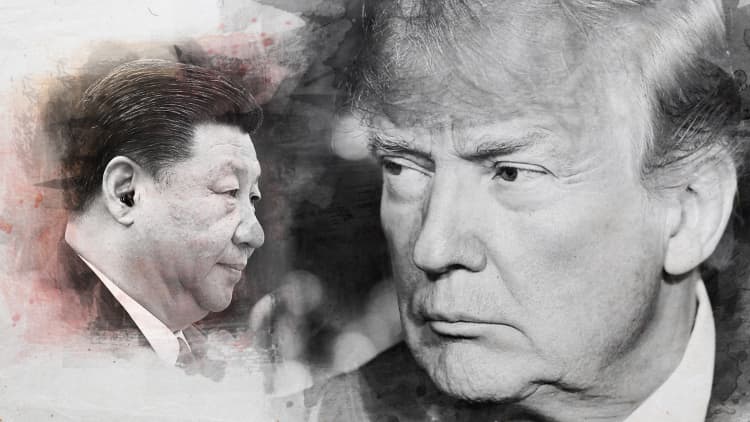Chinese President Xi Jinping is set to kick off a week-long expo on Monday that promotes his country's status as a major consumer of the world's goods.
The opening speech comes a day before Americans head to the polls for midterm elections, and amid growing bipartisan criticism of China, particularly over its treatment of foreign companies and intellectual property. The major Chinese event, however, will seek to position the country as an importer of goods, drawing in top executives in the process.
Although plans for the China International Import Expo were announced more than a year ago, the event will stand in contrast to Beijing's ongoing trade fight with the United States: President Donald Trump has targeted his country's $375 billion goods trade deficit with China by levying tariffs on an extensive list of products. China, for its part, unsuccessfully tried to negotiate on tariffs by offering to buy more U.S. goods, but ultimately responded with duties on products from the U.S.
"It's about the Chinese being able to take ownership over the approach to these discussions," said Peter Alexander, head of consulting firm Z-Ben in Shanghai. He noted that if Trump and Xi come to an agreement behind closed doors at the G-20 meeting in Argentina later this year, it will appear the Chinese conceded to the U.S.
Such a G-20 outcome is anticipated by some, but China can use the expo — and the 40th anniversary of reducing state control on the economy — to tell the world it is still moving forward with plans to buy more, Alexander said. Then, he noted, the Trump administration will need to respond.
The expo is set to draw more than 2,800 companies from more than 130 countries to Shanghai from Nov. 5 to Nov. 10, according to official figures.
Xi's government announced the event in May 2017, which was before tensions with China's largest trading partner had escalated. But Beijing is clearly trying to send a message with its plan to welcome over 100,000 professional buyers to the expo. As an official statement from a Chinese embassy puts it: "It is a significant move for the Chinese government to hold CIIE to give firm support to trade liberalization and economic globalization and actively open the Chinese market to the world."
Local schools and government offices are even closed for the first two days of the expo, although the country's stock market will remain open.
"I'm sure (Xi) is going to emphasize openness because this is the 40th year of opening (up)," Wang Huiyao, an advisor to the Chinese government and the president of Beijing-based think tank Center for China and Globalization, said in a phone interview.
"I think this expo is aimed at the U.S. as well, because it really shows China wants to buy more, and that is what President Trump is looking for," Wang said. "This expo (may represent a) new phase of China."
The U.S., however, reportedly does not plan to send senior government officials to the event.
Beyond the expo
Beijing will also need to convince American businesses that China will match its words with actions.
"There have been some moves in the direction of opening up and that's good and that's welcome, but it's really really small," said William Zarit, chairman of the American Chamber of Commerce in Beijing and senior counselor at The Cohn Group, a consulting firm. He noted that general services, logistics, medical devices and construction are some areas where Western firms still report an uneven playing field with state-supported Chinese companies.
"Frankly," Zarit said, "I think this is really the key to defusing a lot of the friction and tensions: significant, sweeping, timely reforms."
Holding an expo focused on imports also plays into China's own economic needs. Beijing would like to boost domestic consumption as it tries to turn its economy away from relying on manufacturing for growth. For now, China remains a major exporter of goods.
Sales of products to the U.S. grew this year, resulting in a record surplus in September, according to state figures. The pace of overall year-on-year export growth picked up in September at 14.5 percent, while a 14.3 percent increase in imports marked a slowdown from August.
WATCH: This trade deal may be what Trump needs to take on China



